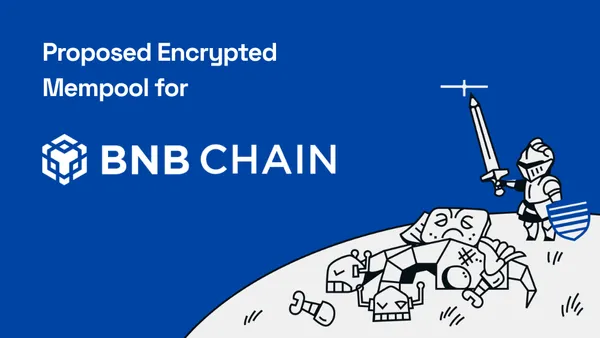Shutter proposes the clearest path to winning BNB Chain’s war against malicious MEV - an encrypted mempool.
If CZ can get sandwich attacked, anyone can.
Just a few weeks ago, Binance founder CZ shared in a tweet that he got sandwich attacked:
He was testing a trade on PancakeSwap using a public RPC - and got hit by a sandwich attack. His takeaway? This kind of malicious MEV needs to be eliminated. And he’s not alone.
The BNB Chain community is now actively fighting back. In fact, it’s declared war on malicious MEV. And as of yesterday, Shutter has joined the front lines by proposing an encrypted mempool for BNB Smart Chain to add encrypted transactions. If accepted by the community, an encrypted mempool could finally end front-running and sandwich attacks, winning the war.
BNB Chain Is Under Attack
Let’s start with why this matters.
On December 1, 2024, more than 33% of all blocks on the BNB Smart Chain contained sandwich attacks. That’s over $1.5 billion worth of DEX trades impacted in just 24 hours, according to Decrypt. Tens of thousands of trades were affected in a single day.
These aren’t isolated incidents either. Estimates suggest that over $1 billion in user value has been lost to these kinds of manipulative tactics on the BNB Chain alone during the 2020s.
This level of MEV abuse isn’t just an inconvenience - it’s a systemic issue affecting the regular users, traders, protocols, and their trust.
The Fight Back Has Begun
In response, BNB Chain has rallied together a coalition called the BNB Good Will Alliance, a network of builders, dApps, and validators, all committed to pushing back against MEV exploitation.
Since then, validators have been encouraged to accept block bids only from trusted builders, and filtering systems have been implemented to remove toxic trades from the public mempool. They’ve also put out a call for alliance members to submit other solutions to address the malicious MEV threat.
But filtering can only go so far. To truly stop front running and sandwich bots, you need to prevent them from seeing the trades to begin with.
That’s where Shutter’s encrypted mempool comes in.
A Proposal for Encrypted Mempool on BNB Chain
Yesterday, Shutter submitted a proposal to bring threshold-encrypted mempools to BNB Chain. The proposal was developed in collaboration with brainbot, Erigon, and NodeReal.
Here’s the core idea:
When a user submits a transaction, it’s encrypted before entering the mempool. That means bots can’t see it. Validators can’t front-run it. Builders can’t reorder it for profit.
Only after the block is finalized and the transaction order is locked in, the data is decrypted and executed, eliminating the visibility aspect that MEV bots generally use to exploit transactions.
The system uses threshold encryption, a cryptographic method where no single party can decrypt or manipulate a transaction. Instead, a group of participants (Binance validators or a designated Shutter Keyper set, governed by Shutter DAO 0x36) must work together to perform decryption, ensuring decentralization and removing single points of failure.
Once integrated, the encrypted mempool will significantly strengthen the BNB Chain by enabling:
- Malicious MEV protection – Front-running and sandwich attacks become virtually impossible
- Real-time censorship resistance – Privacy at submission reduces opportunities for interference
- Better transaction ordering – Transaction order is locked in before decryption
It’s the same system that’s already live and has proven its effectiveness on the Gnosis Chain.
If implemented, validators using the upcoming Erigon v3 client on the BNB Chain would be able to opt-in to accept encrypted transactions. A dedicated version of Erigon is being developed specifically for this purpose, enabling encrypted mempool support without disrupting existing validator workflows.
This system is fully optional: regular transactions will still be supported, while users and RPCs can choose enhanced privacy when needed.
The proposal is currently high-level; specific implementation tasks, milestones, and deliverables will be outlined in future phases as the community provides feedback and if development progresses.
What’s Next? Join the Discussion!
The proposal has been submitted. Now it’s up to the BNB Chain community to discuss, provide feedback, and decide whether to move forward.
We call on you to join the discussion, share your opinion, and ask questions. Let your voice be heard. Let's bring an encrypted mempool to BNB Chain!
- Read and comment our proposal here: BEP-547: Encrypted Mempool for Binance Smart Chain
- See BEP PR: https://github.com/bnb-chain/BEPs/pull/559
- See Proposal text: https://github.com/Smokyish/BEPs/blob/master/BEPs/BEP-547.md
- See BNB Chain's Call for Proposal: https://forum.bnbchain.org/t/call-for-proposal-addressing-malicious-mev-attacks-on-bnb-chain/3167
Final Thoughts
BNB Chain has already taken the first steps in fighting malicious MEV. But as CZ’s own experience shows, the problem is deep, and the need for protocol-level fixes are urgent.
The integration of an encrypted mempool into the BNB Chain is the best solution to win this war, by putting privacy, fairness, and decentralization at the core of the network.
The war against malicious MEV is far from over. But with this proposal, BNB Chain has a real chance to win it.








